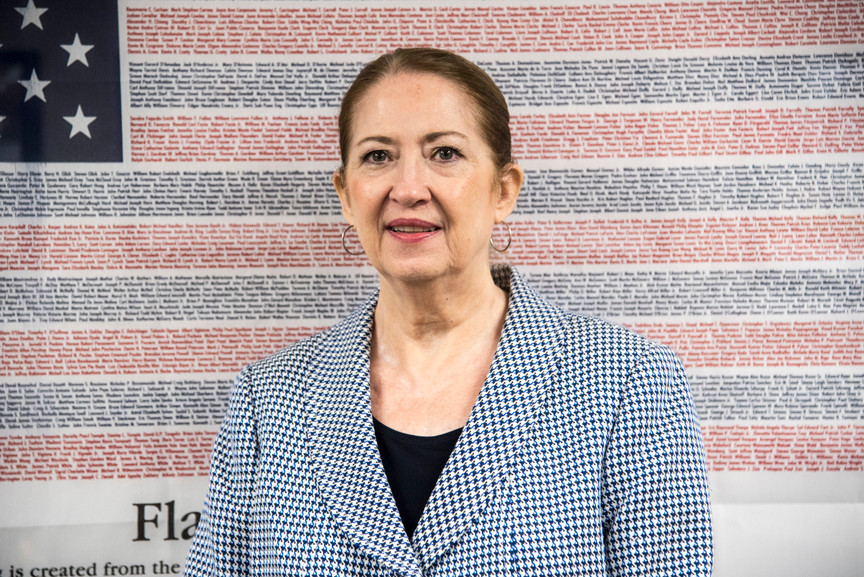College’s new dean has unique perspective
Back in her student days, Karen Nicholson turned down a full scholarship to Marshall University to attend a historically black college where she had taken summer classes, West Virginia State College – a non-traditional choice for a white woman.
The experience shaped her outlook on education, which Ms. Nicholson now plans to bring to her role as Manhattan College’s new dean of the School of Education and Health.
The years at West Virginia State College “raised a sensitivity to diversity issues that maybe I wouldn’t have been aware of,” she said.
Ms. Nicholson grew up in a low-income family and while in high school, took classes in the Upward Bound program – a tutoring and academic support program for low-income and first-generation college-bound students.
In the summer, she took Upward Bound classes at West Virginia State College and lived on campus. So when the time came for her to choose a college, West Virginia “just felt like a natural place to be for me,” she said.
Ms. Nicholson earned her bachelor’s and master’s degrees at West Virginia State College, and received a Ph.D. from Ohio State University.
As she begins her first academic year as a dean at Manhattan College, where she has been teaching since 1994, Ms. Nicholson spoke with The Press about her plans for the Education and Health School, interest in working more closely with school districts and keeping teachers in the profession.
Below are highlights from the conversation. The answers have been edited for brevity.
What is your vision for the School of Education and Health?
“I would really like to see with the School of Education and Health is that we really engage with the community, the broader community … not just District 10 and throughout the Bronx and upper Manhattan.”
“We look at how can counseling, administration and teacher prep go together. We all have the same mission and look at doing some shared sites out in the schools, where all of us could work together.”
“I would really like to sit with those schools and say, ‘How can we benefit you?’ and at the same time meet our needs of having experiences for our students so they become more relevant for both of us. “
What are some of the challenges that you face in your new position?
“It’s getting all the different departments: radiological, kinesiology, counseling and graduate and undergraduate, and having everyone come together and identify a common vision that we are all working towards from our own perspective.”
“I think the challenge always is finding time to then get engaged out in the schools, out in the community organizations, the hospitals to build those collaborative relationships.”
“The fact that District 10 has the most homeless children in the city of New York and District 9 the highest percentage, I think those are things we, as an institution, need to be thinking about and looking for ways we can all work together to provide support.”
How would you go about bringing young people into the profession when the pay is not where it should be?
“The pay is not where it should be, the public perception right now, the regulations, - [all] that is scripting what goes on in the classroom.”
“Those are serious problems and I do think a lot about that because how do you balance what you know about learning with the reality out there? The fact is that when someone wants to be a teacher – it’s kind of a passion, a mission for them and they want to do it. So, the job doesn’t become how you can prepare them for something that you know they are not going to be as respected, as well rewarded.”
How do you address the burnout rate?
“I think one of the things is to just prepare them for the reality that they are facing, so they know going forward what they are going into, and to prepare them with the skills. We do talk about burnout in the classes, what are some of the signs of it and what you can do to renew or keep yourself motivated and to work with your children.”
“A lot of my students say they want to go into the urban schools. They want to be there where they can make a difference.”
What is a personal experience that shaped your views on education?
“I [grew] up in West Virginia, in a rural area. I think teachers made huge differences in my life, and reading, losing myself in books and knowing the value – that when you can have a very limited worldview, books and people who have experienced other things, can expand those.
“And I think the other thing that probably was the most impactful to me for coming here was I went to a historically black college.”
What do you want the Riverdale community to know about you?
“Preparing personnel for the schools, particularly teachers, has been a lifelong passion for me.”
“I think … that education for the children in the schools – and especially underserved children, children of poverty and homelessness or any other factor that would limit them from reaching their potential—[is] really important.”






